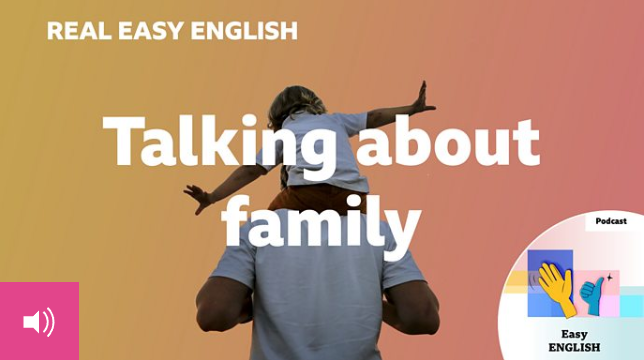Introduction
Neil and Beth have a real conversation in easy English about their families. Learn to talk about your family and some useful words to compare them.
Vocabulary
compare
to look for the difference between two things
get on well with
have a good relationship with
smaller/bigger
ways to compare the size of something
youngest/oldest
ways to compare the age of someone or something
Transcript
Neil
Welcome to Real easy English from BBC Learning English.
Beth
In this programme, we have real conversations in easy English to help you practise listening and learn new words and phrases. I’m Beth.
Neil
And I’m Neil. In each episode, we talk in English about a different topic that you need for everyday speaking. If you want to read along, you can visit our website: bbclearningenglish.com.
Hello, Beth.
Beth
Hi, Neil. How are you?
Neil
I’m very well, thank you. What are we talking about today?
Beth
Well, today’s episode is all about family. We’ll be talking about who is in our families and comparing them.
Neil
OK, great. So, what do we mean when we say comparing our families, Beth?
Beth
Well, when we compare two things, we look at them and see if they are the same or different and we can compare things in different ways, but we often do it with adjectives.
Neil
OK, let’s start the conversation.
Beth
So, Neil, how big is your family?
Neil
It’s probably average, really. I have one sister, but she has three kids and I have two kids. So, when we get together with my parents, there… there are a few of us. It’s not… It’s not tiny. It’s not huge.
Beth
OK, yeah. I think my family is definitely smaller than yours because I don’t have any brothers or sisters. I am an only child. So, when I get together with my family it’s very small because I also only have one cousin and she’s an only child as well. So my family’s tiny!
Neil
OK. And what is your family like? It’s small, but what’s it like?
Beth
It is small, but we’re very close. So, we see each other quite often. We are a bit silly. We like to go out and have food and play games and we can be quite loud, even though there aren’t many of us.
Neil
OK, it sounds like you get on well with your family. Is that right?
Beth
Yeah, definitely. I love spending time with my cousin and she has two children.
What about you? Do you get on well with your sister?
Neil
Yes, I get on well with my sister. We don’t see each other very often because we don’t live in the same place. But when we see each other, we have a nice time. We catch up and chat.
So, Beth, we have used the expression get on well with someone. What does that mean?
Beth
Well, that means that you have a good relationship with them. So, if you get on well with your sister, it means when you’re together you’re happy, you’re not fighting. It’s easy to have good conversation. You don’t really have any arguments. Maybe when you were a child, you didn’t get on well with your sister. I don’t know.
Neil
Yes, I think now that we’re grown-ups it’s easier to get on well with your siblings. When… When…When I was a kid, maybe I was a bit mean to her.
Beth
Oh dear!
So, Neil, your sister has three children.
Neil
Yeah.
Beth
What are the ages of them?
Neil
Well, for a start, they’re all boys!
Beth
OK. Oh, my gosh. That sounds very difficult!
Neil
And the oldest one is 17 and he has just done his driving test. It’s difficult to believe because, he’s the oldest, he’s always been the oldest, but now he’s almost an adult.
Beth
And is he the oldest including your children?
Neil
Yeah.
Beth
So out of all the kids he’s the oldest?
Neil
He is, yeah.
Beth
So, in my family, my cousin has two children and they are five and two.
Neil
Ah! Little ones.
Beth
Yeah. They are the youngest in the family. But I was the youngest in my family until they came along and I am 32! So, I was used to being the youngest, but I’m not the youngest anymore, now we’ve got little ones.
Neil
Oh well! Are you sad?
Beth
No, I’m OK.
Neil
OK, let’s quickly recap the vocabulary we learned in this conversation.
Beth
We learnt compare which means to look at two things to see if they are the same or different.
Neil
Bigger and smaller, which are ways to compare the size of something.
Beth
Youngest and oldest which are ways to talk about the age of someone or something.
Neil
And we looked at get on well with someone, which means to have a good relationship with them.
Beth
Thanks for listening to Real Easy English. Visit our website for more activities and courses to help you with your English: bbclearningenglish.com.
Neil
Next time, we’ll talk about food and some of our favourite meals to eat.
Beth
Mmm, delicious! See you, then. Bye!
Neil
Goodbye!
